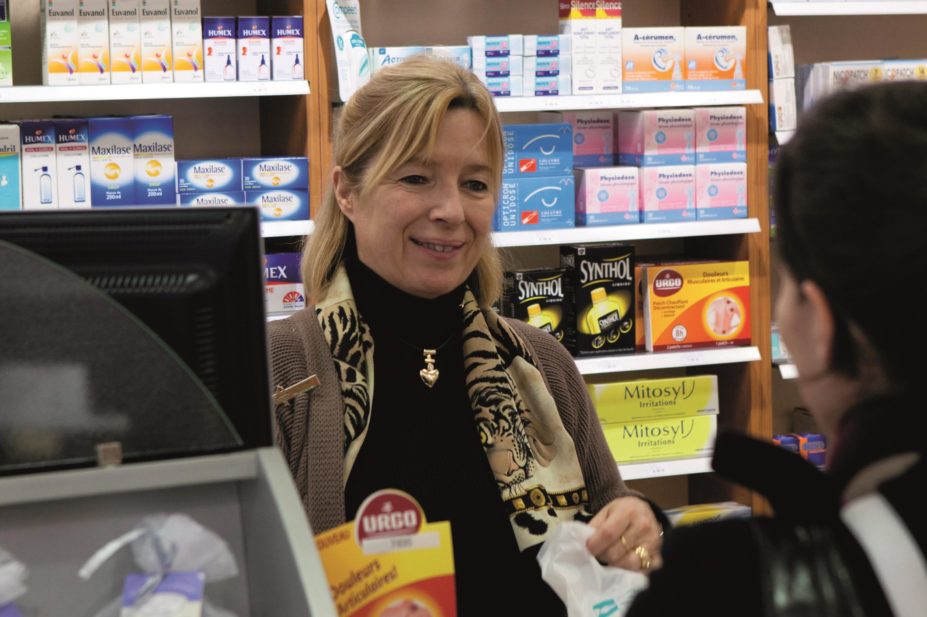
BSIP SA / Alamy Stock Photo
Community pharmacy counter assistants (or medicines counter assistants) are often the first people customers will interact with in a pharmacy. It is their job not only to advise patients correctly about their health needs but also to act as brand ambassadors for the business. They need the knowledge and confidence to talk to customers and promote the pharmacy as a hub for healthy living advice and care.
Experience and skills
A counter assistant is involved in the sale of over-the-counter medicines and works under the supervision of a pharmacist. They are trained to offer advice on common ailments and must know when to refer a customer to a pharmacist.
Training is obviously important but, before you get to that point with a new staff member, you need to make sure you have hired someone with the right experience and skills to be a good fit for such a customer-focused role.
Louise Austin is the owner and superintendent pharmacist of Abington Pharmacy in Northampton. She employs four counter assistants, one full time and three part time, as well another full-time pharmacist; three national vocational qualification (NVQ)3 pharmacy technicians; seven part-time NVQ2 dispensing assistants; two part-time administrative staff and, usually, several preregistration trainees.
“I usually ask for someone with experience of working in a pharmacy, but I get loads without who still apply,” she says. “I ask candidates to send me a CV along with their application so I can do a paper sift, and then one of my colleagues will have an initial phone call with the shortlisted ones to get a sense of whether they are personable, because that is vitally important.”
But lack of pharmacy experience is not necessarily a deal-breaker for Austin: “If they did not have that I would look for previous retail experience at least. We do get quite a few applications from people who have done care work but I have not tended to progress those because, although their empathic skills are probably good, we are after people who know how to conduct themselves in a retail environment.”
Customer-facing experience is something that Graham Phillips, director and superintendent pharmacist of the Manor Pharmacy Group — seven independent pharmacies located across Hertfordshire plus two in Kent — is also after in potential counter staff. “Some history of working with the public is important, and I like to see that they have common sense, good communication skills and adaptability,” he says. “You never know what is going to happen from one minute to the next in a community pharmacy so I will ask how they cope with stress. Empathy is also vital because patients are often upset, or elderly and confused, so it is important that they feel supported and respected, and there has to be an understanding of patient confidentiality as well.”
The larger multiples take a similar tack. HR director at Well (formerly The Co-operative Pharmacy), Tracy Barton, says: “In essence what we look for when recruiting healthcare assistants is strong customer service skills, ideally gained in a pharmacy or retail or care environment, passion for delivering great healthcare advice in a local community, and strong organisational skills. They must be friendly with a real passion for people and the ability to build relationships, and we would expect them to have a pharmacy services qualification or be working towards or willing to study for one.”
Interview insights
Once you have whittled down the applications, it is time to invite your shortlisted candidates for an interview, so it is vital to prepare questions that will give you more insight into the skills and personality of your potential counter assistant.
When it comes to interview, Barton asks some detailed and distinct questions, including: “Describe a time when you believe you have excelled in meeting customers’ needs. How do you know that your actions have gone beyond the customers’ expectations? How did the customer react?”
She also tries to access a more personal perspective, asking: “Tell me about something you have achieved and are proud of — what was the situation and why is this your greatest achievement? What did you learn? What did you or do you like about your current role? And why do you want to leave?”
Austin likes to pose a couple of scenarios to gauge candidates’ reactions to certain situations. “For example, I might ask how they would deal with a customer who was a drug addict who was getting lairy in the pharmacy and demanding medicines at the same time as they are serving another customer,” she says. “I would hope the candidate would answer that they would say something to the person they are serving first so they know they are not forgotten, and then call a colleague to either take over from them or deal with the disruptive customer.”
As far as Phillips is concerned, the key is to “interview for attitude and skills and because you can train for knowledge”. For this reason he also conducts competency-based interviews and asks for examples of how they would handle a certain circumstance: “For example, I might ask what they would do on a busy day when a colleague has called in sick and there is a long queue forming at the counter. I hope they would say that they would look up, smile, acknowledge everyone and say they would be with them as soon as they can.”
Employers’ responsibilities
Once you have found your perfect counter assistant, it is up to you to progress their training. Since 1996, anyone working in a pharmacy who supplies medicines as part of their role must undertake an accredited medicines counter assistant course, or the relevant units of a dispensing assistant or pharmacy technician course recognised by the General Pharmaceutical Council (GPhC).
The requirement is that courses should cover the knowledge and understanding associated with particular units of the pharmacy services skills S/NVQ level 2 (qualifications and credit framework) course, entitled:
- Assist in the sale of medicines and products (Pharm 05 — unit 4)
- Receive prescriptions from individuals (Pharm 07 — unit 5)
- Assist in the issuing of prescribed items (Pharm 32 — unit 15)
The length of the course varies between programme providers (see ‘Organisations accredited to provide training’) from three to six months. The GPhC requires that a counter assistant must be enrolled on a training programme within three months of commencing their role (or as soon as practical within local training arrangements) and has completed the training in a maximum of three years.
Furthermore, it may be necessary for an assistant who either holds a qualification completed some time ago or has taken a prolonged break from the role to undertake relevant units of an approved training course to ensure their knowledge remains up to date.
Career moves
With the right attitude and training, it is possible for counter assistants to progress their careers within the pharmacy arena, although, according to Austin, “it really depends on the candidate and what they want to do”.
“If they are keen on training they can show initiative and progress to do NVQ2 and possibly 3, up to accuracy checking technician level, but if they are young they often tend to lose interest, which is a shame — especially if we can see potential in them,” she says.
Marc Donovan, chief pharmacist at Boots UK, agrees that “young people are the future of community healthcare provision”, and to this end, Boots has just launched its Healthcare Colleague Apprenticeship Scheme, which offers a career starting point for young people aged 16–18 years who want to work in healthcare and pharmacy.
Applicants to the scheme need a GCSE in mathematics and English at grade C or above, but Donovan says: “For these roles and other healthcare adviser roles at Boots UK we really look for those with an enthusiasm for healthcare and a motivation to succeed. Community healthcare is a rewarding career and being a healthcare adviser at Boots UK can lead to a whole host of career progression and further education opportunities, including dispensing, pharmacy, retail and store management roles.”
Phillips also plots a possible two-way split “in the retail direction as a supervisor, or towards the dispensary in technician roles”.
“I tell candidates that we will provide them with a career not a job,” he says. “We have taken people with no formal qualifications and, in the end, they become qualified checking technicians. Pharmacists are good at promoting this kind of social mobility, so above all I want to see a vocational commitment from candidates because working in a pharmacy is more than just a job.”
Organisations accredited to provide training
The following organisations are currently accredited by GPhC to offer medicines counter assistant training courses (see http://www.pharmacyregulation.org/education/support-staff/medicines-counter-assistant/accredited-courses)
- Boots UK Healthcare Advisers’ Programme
- Buttercups Training Medicines Counter Assistant Course
- CIG Healthcare Partnership CounterIntelligence
- MediaPharm Track and Train: Medicines Counter Assistant Training
- National Pharmacy Association (NPA) Interact
- Scientia Skills Medicines Counter Assistant Programme


